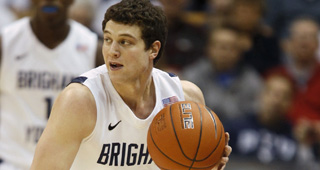Kemba Walker and Jimmer Fredette are both enjoying unique seasons as not only two of the nation’s leading scorers, but also the leaders of two highly-ranked programs.
Therein lies the rarity of what we’ve seen in college basketball this season. You don’t see two dynamic scorers with bright futures that often, but it’s even rarer that their teams are just as great.
In this week’s Associated Press poll, Fredette’s Brigham Young Cougars (25-2) are ranked seventh and Walker’s Connecticut Huskies (20-6) are 14th. While BYU is at their apex, UConn was ranked as high as fourth earlier this season.
Walker is averaging 22.9 points per game, compared to Fredette's 27.2 points per game that leads the country. Fredette has had three games with 40-plus points, all of which came in a four-game span (all wins) when he averaged 38.3 points on 51% shooting.
Meanwhile, Walker has cooled after a scorching start. He exploded for 42 against Vermont on Nov. 17, but he has scored more than 20 points in just three of UConn’s last nine games.
His struggles have dropped him to seventh in the nation in scoring.
The Morrison-Redick Comparison
Going back to the 2001-02 season, when the immortal Jason Conley of VMI led the nation in scoring (29.3), you begin to see why this season is so special.
Entering Wednesday’s action, Fredette and Walker have suffered eight losses between them. You have to go back to the 2005-06 season to find a pair of players that were among the nation’s most explosive scorers while also playing on elite teams.
Those two players were, of course, Gonzaga’s Adam Morrison and Duke’s J.J. Redick. They finished one-two in scoring and both advanced to the Sweet Sixteen. The Bulldogs (27-3) and Blue Devils (30-3) were ranked even higher than the Cougars and Huskies have been this season.
Duke finished the regular season at No. 1, while Gonzaga finished fifth. Neither team was ranked lower than tenth that year.
It remains to be seen how far Brigham Young and Connecticut will advance in the Big Dance, but it’s clear that Fredette and Walker will hold the key to each team’s success. When Morrison led the nation in scoring five years ago, he averaged 24.3 points on 47.2% shooting in three tournament games. Redick scored 20 points per game on 38.4% shooting in three contests before Duke was eliminated by an LSU team led by Tyrus Thomas and Glen Davis.
Forecasting NBA Success
If we only compared Fredette and Walker to Morrison and Redick, then we’d assume that Fredette would be wildly disappointing in the NBA and that Walker would find a niche somewhere as a solid bench player.
Making that assumption, however, would be unfair to all four college superstars.
The list of college basketball’s most prolific scorers is often littered with the most talented players on small school programs, minimizing their achievements significantly. Over the past decade, however, there have been several future NBA players among the NCAA’s leading scorers.
Stephen Curry, Lester Hudson, Michael Beasley, Kevin Durant, Gary Neal, Ronnie Price, Kevin Martin and Melvin Ely all finished at, or near, the top of the nation’s list of top scorers and have gone on to put some sort of stamp on the NBA.
A career like Durant’s would be ideal, but if Fredette and Walker were smart they’d be content with a run like that of Curry, Beasley or even Martin.
Neal provides an interesting case because of the extraordinary route he took to the NBA. He graduated from Towson in 2007 and spent time in Europe when he went undrafted four years ago. After stops in Turkey, Spain and Italy, he caught on with the Spurs prior to the 2010-11 season.
He played his way into a three-year deal with one of the league’s most stable and professional franchises after a strong run during last July’s Las Vegas Summer League. Neal quickly earned the confidence of San Antonio coach Gregg Popovich, playing a total of 40 minutes in his first three NBA games.
The combo guard has been in the rotation ever since, averaging 8.8 points (fifth among rookies) in 19.7 minutes per game. He is shooting 41% from three-point range, first among rookies that have appeared in at least half of their team’s games and attempted more than one three per contest. He was even played in the Rookie Challenge last week, being a teammate to former number one overall picks Blake Griffin and John Wall.
Neal is a perfect example of why judgment shouldn’t be passed on a player immediately.
In the case of Fredette and Walker, I don’t foresee a Morrison situation. Having a strong secondary skill is vital to success at the next level and both players have promise in that department.
Fredette handles the basketball well, has NBA range and is more athletic than one might think, while Walker is a very good defender and can score in a hurry. Walker’s ability to put up points in bunches bodes well for his professional prospects because he won’t be the focal point.
The popular belief is that Walker has a better chance of succeeding at the NBA level than Fredette, but there is clearly a place for both -- whether it is immediately or a few years down the line.



